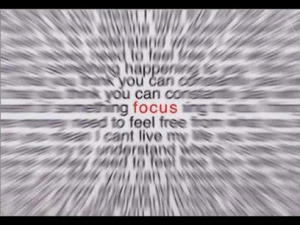Focus, people, focus!
 Tuesday, August 25, 2009 at 06:15PM
Tuesday, August 25, 2009 at 06:15PM ... maybe it's time to stop e-mailing if you're following the game on TV, and rethink singing along with the radio if you're reading the latest news online. By doing less, you might accomplish more. - Adam Gorlick, Stanford News, August 24, 2009
 Watching a YoutTube Video or IMing your peeps as you read this? You ought not to. Multi-taskers don't do ANY of their multiple tasks well according to this Stanford study.
Watching a YoutTube Video or IMing your peeps as you read this? You ought not to. Multi-taskers don't do ANY of their multiple tasks well according to this Stanford study.
People who are regularly bombarded with several streams of electronic information do not pay attention, control their memory or switch from one job to another as well as those who prefer to complete one task at a time, a group of Stanford researchers has found.
As someone who has secretly been envious of those of you who seem to be able to do five things at once while I need quiet and concentration to get anything done - even poorly, this report makes me happy. Schadenfreude.
Go ahead, read the article, but turn off Twitter while you do. I can wait. Thanks.
Are there implications here?
- Should we be allowing/encouraging multi-tasking in our classrooms or should students be required to put the devices away even when the class is dull?
- Is backchanneling during conference sessions actually enhancing the learning experience or just being a counterproductive distraction?
- Rather than trying to absorb so much information that we need to take it in two and three streams at a time, ought we not prioritize what we read, hear and view and let the less important go? (I asked in an earlier post "If you had to pay for a Web 2.0 program, would you still use it?" A corollary might be, "If you had to pay a subscription for a blog, would you still read it?" Wait, don't answer that!
I'm going to go read a good book. In a quiet place.
On a very serious note, here's a PSA about one very real danger of multi-tasking - texting while driving. Please remember that you are sharing the roads with my grandchildren. That text can wait. (This is a very upsetting video - I couldn't watch it all.)
For my fellow true contrarians out there, here's another "counter" view of social networking: Why if you want to keep your friends, don't use Facebook. Enjoy.









Reader Comments (6)
The myth of multi-tasking is gradually dying. I often find that people who are successful and think they're multi-tasking are actually just using a system (like GTD or one they've built themselves) that helps them build a trust-worthy to-do list so their mind can let go of extra details until they are needed.
The WSJ article is pretty neat, but all the examples seem to be using Facebook as the medium for some other communication failure. Not able to keep your work and personal lives separate? Not able to decide what stories are actually interesting to your friends? Fighting with your roommate? You can't really blame Facebook for these -- you'd be having the same problems if it never existed!
I think 'back channeling' is just the same as if two attendees sitting next to each other were having a whispered conversation. Although, I'm not sure if it would be less distracting for a presenter to see two people talking versus someone intently looking at their PDA.
I will agree on the multi-tasking bit; that's why I tell people I'm simul-tasking. =D
I think the problem isn't multitasking, it's teaching students when it's ok to multitask.
For example, I may need to have knee surgery in the future. I do not - really, do not want my surgeon multitasking at that moment. Call me selfish, but I want all his attention. Every little last bit.
That same surgeon could surf the web and watch tv at home and I wouldn't care at all.
Students (ok, and many adults) need to understand when it's ok, when it's not and learn that focus and quiet are not necessarily bad things. Heck, many of my kids need to learn how to focus.
Multi-tasking is one of those things that has two really divergent belief groups. I am not sure what the answer is, but I read whatever I hear about it. Do old people need to focus more because they learned to be that way? hmmmm There is a Brain Rule about this in John Medina's Brain Rule list. He says people cannot multi-task they just switch what they are working on and it actually slows them down and makes them less effective...
To Andy:
The difference between back-channeling and whispering to your neighbor during a lecture is engagement. The people who advocate back-channeling say that they are more engaged and they are sharing awesome content to people who could not be at that particular event. They are also less distracting than people who whisper during a lecture. At least I think so.
Hi Andy,
I guess as a presenter I would be more tempted to dope slap the people talking. A good presenter should, however, allow regular times during the session for participants to discuss. (And blindly hope they are on task!)
Interesting thought. Thanks,
Doug
Good point, LAzy. I think this is why people who use their cell phones while driving make me so angry. I would prefer all their attention was on keeping in their own damn lane.
Doug